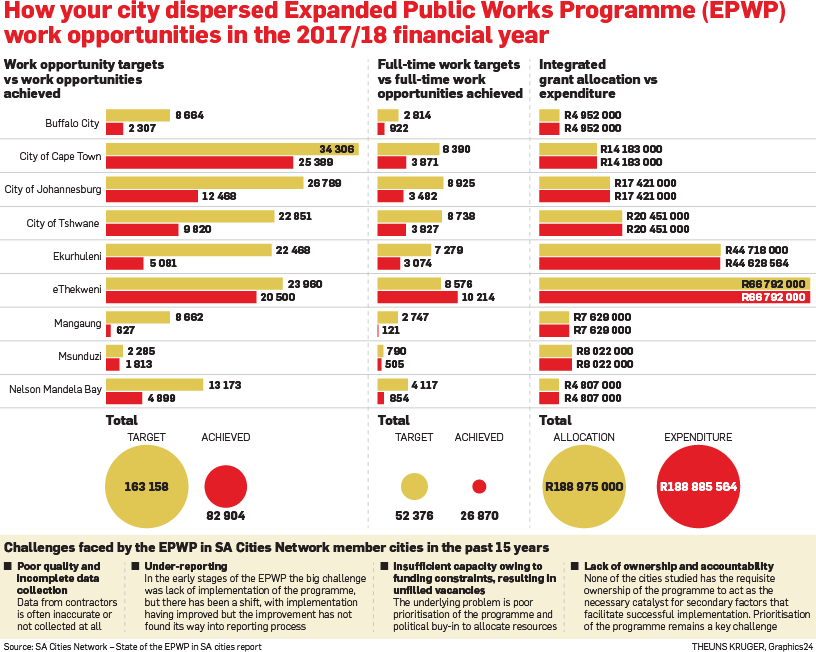
Some cities successfully carried it out and created value in the lives of communities, but others failed to implement basic control policies and officials are passing the buck
They didn’t know how many people worked in their Expanded Public Works Programme (EPWP) and failed to compile a register with their names and identity numbers.
That’s what the City of Tshwane is alleged to have done in the past financial year, according to an internal audit report by the national department of public works.
The report was tabled at the launch of the 2017/18 State of the EPWP in South African cities report released by the SA Cities Network (SACN) last week.
The SACN audited the EPWP programmes administered by the City of Johannesburg, City of Tshwane, eThekwini, Ekurhuleni, Buffalo City, Nelson Mandela Bay, Mangaung, Msunduzi and the City of Cape Town.
The EPWP has provided 3.2 million work opportunities in the past five years, including short-term and longer-term jobs across the country for unemployed people who perform tasks from cutting grass and filling potholes to working as mechanics for a stipend of a minimum R88 per day.
The SACN report found that only the City of Cape Town had done well to create job opportunities through the programme.
“Cape Town has also done well in terms of mainstreaming EPWP,” said Ignatius Ariyo, chief director of the EPWP infrastructure sector at the public works department, adding that the reports were well compiled and that there was proper communication between the city and the departments involved.
“eThekwini has done well in terms of duration of work opportunities, in terms of what we call full-time equivalence,” said Ariyo, who is also the SACN research project leader.
This means more long-term and skilled positions for which training is provided.
“eThekwini’s work opportunities are of a longer duration, so they have a bigger impact in terms of poverty alleviation. It’s not just about numbers, but how long the work opportunities are and what impact we are having.”
Public works chief director for sustainable livelihoods, convergence and compliance Lindiwe Nkuna said the internal audit report showed that Tshwane did not meet the requirements, compared with other cities.
The requirements included not having adequate attendance registers for EPWP workers and not providing them with the required training.
Nkuna said other areas of Tshwane’s “unsatisfactory” performance included the inadequate collection of project data, which involved counting the workers and registering their identity numbers to prevent potential corruption and abuse of the system.
Nkuna said her department had to validate worker information.
“We validate them with home affairs so that on our side we are able to link the participant with their ID number and name,” she said, adding that without this and a proper register the system could be manipulated to allow people to be paid without working.
Alice Mpahlele, the EPWP coordination director at the City of Tshwane, did not deny the allegations contained in the internal audit report, but said the blame should be placed on the implementers of the programme in her city, who came from various government departments and were not city employees.
The public works department is busy devising a policy around the EPWP to resolve some of the problems the programme faces, including implementers who are not accountable and dealing with allegations such as hiring people according to their political affiliation.
Nkuna said not having such a policy resulted in government being unable to take action against implementing institutions that failed to comply.
The draft policy, which is expected to be approved by the ministry in December, will allow accounting officers of various government departments to act on EPWP audits by Auditor-General Kimi Makwetu, which are sent to the minister.
“We can then start ensuring that people account at the right level because currently it’s difficult to do that,” Nkuna said.
On allegations that EPWP workers were hired based on their political affiliations, Nkuna said last year the department compiled recruitment guidelines which counteracted this, including that workers must live in a community in which a project is implemented, except in instances where the local people don’t have the required skills.
“At national level, we might not be well versed with these allegations [of workers being employed based on political party affiliations] because we are not the implementers. [The various departments and cities] are the ones that own the purse and they are the ones that decide how recruitment is done,” Nkuna said, adding that this was not what the poverty-alleviating programme was developed for.
“The recruitment guidelines also encourage that there be systems in place so it is known how participants are recruited. We speak of fairness, transparency and equity. We are advocating that participants must be recruited from all walks of life – different races, genders and even political affiliations,” she said.
The department had, she said, investigated similar allegations of political manipulation and handed the cases to the Special Investigating Unit.
Nkuna said the new policy would identify the officials and political heads of departments responsible for implementing the programme, which was not currently the case.
“The EPWP is a flagship programme that is pronounced by the president on the targets that are set, which are also broken down at a provincial level. What we’ve picked up over the years is that there are inconsistences in terms of the support it is receiving,” she said.
She added that some provinces were better off than others, but did not reveal which ones. And while some enjoy political buy-in and projects are implemented and driven by those with the power to do so, others are left to lower-ranking officials without the power to make decisions.
“The policy should spell out who should account to the president on targets that are set for the EPWP.”
 |
| ||||||||||||
| |||||||||||||




 Publications
Publications
 Partners
Partners









